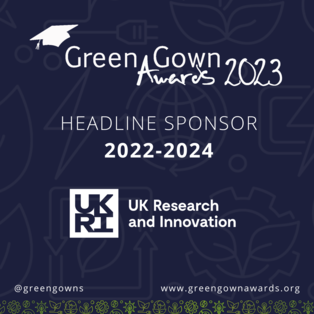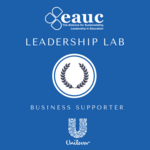EAUC Leadership Lab 2019
21st Jan – 23rd Jan 2019 12:30 – 14:00
The EAUC Sustainability Leadership and Innovation Programme
By Invitation, Referral or Nomination*
*this includes self-nomination, which needs to be accompanied by a letter of endorsement from your institution
A transformational leadership and personal development programme to develop expertise and confidence as a strategic sustainability leader involved in co-creating thriving, sustainable communities through your work in universities/colleges and wider societal contributions.
Co-Chairs: Professor Wendy M. Purcell, Harvard University and Professor Janet Haddock-Fraser, Manchester Metropolitan University
Who Should Attend?
The programme focuses on leaders, future leaders and change agents to support the sustainable development of their own organisation in a way that also contributes to delivery against the sustainable development goals. The focus is on personal and professional development to support strategic leadership in higher/further education settings.
This program is for senior to mid-level leaders of sustainability from a university or further education college. Sustainability leadership teams from institutions can also elect to attend together. This event is invitation only and places are limited.
This programme is for you if any of the following apply:
- You are working towards developing a more strategic focus for sustainability in your institution (or wish to do so);
- You are seeking means to further sustainability in your institution by engaging with core academic and/or operational drivers;
- Your role requires you to work cross-institutionally, including with academics, professional services staff and/or students.
About the Programme
The programme is designed to:
- Help participants develop expertise and confidence as strategic leaders in a university/college setting;
- Empower participants to close the gap from ‘knowing to doing’ and promote sustainability for institutional value creation;
- Support participants contribution to the co-creation of thriving, sustainable communities locally, regionally, nationally and internationally;
- Offer additional coaching support by arrangement to help participants identify professional/work-related challenges and progress them.
Participants selected for the programme will complete a series of pre-sessional exercises related to ‘Sustainable Self’ which will help frame the sessions. Drawing on the experience and needs of the cohort, participants will be invited to translate knowledge into their own institutional context as well as benefiting from peer-to-peer support. The course will be illustrated with case studies from a range of sectors, providing real-world insights into change in action. It will also help the establishment of a community of practice in the higher and further education sectors, deepening professional networks that can support of peer- mentoring and coaching going forward.
Participants in the programme will be expected to:
- Undertake pre-session and post-session activities, as determined by the course team;
- Engage with the designated materials in a critically evaluative way and seek out additional sources for interest and wider sharing;
- Set aside time for personal reflection and deeper strategic engagement with the topics;
- Contribute in the classroom/online in a way that respects the input of the full cohort;
- Support peer-to-peer and group work;
- Participate in facilitated online workshops and related events;
- Share their learning with colleagues, family and friends;
- Adopt a growth mindset, open to new ideas and lifelong learning.
Each participant will be encouraged to identify a key sustainability and innovation leadership challenge and work on this plan for and/or deliver institutional change; additional coaching support can be made available through the programme by arrangement.
Faculty Team
The Faculty team includes experts from Harvard University, Manchester Metropolitan University, EAUC, UK Further and Higher Education Executives and industry, as well as your peers.
Times and Costs
Programme starts 12:30 Monday 21st January 2019 and ends by 14:00 Wednesday 23rd January 2019.
Price: Educational Member rate is £750.00 (includes fees, accommodation and food, ex. VAT). Non-Member rate is £1750.00. Please note that an invoice will be sent to you once your place has been confirmed. Please do not pay by credit card at the application stage.
If you wish to register your interest please
contact us.
Background to the Programme
The results of unsustainable human development are evident worldwide – climate change, species extinction, pollution, poverty and inequality are reducing our capacity to sustain our ways of life. Humans are on a collision course with the natural world. Global megatrends, from urbanisation to a polarisation of wealth, and societal trends relating to trust and simplicity are all making sustainable development the way forward – the ‘new normal’ in mission-led strategy in universities and colleges.
Environmental, social and economic leadership and governance issues are coming together in powerful ways to shape a more sustainable future and are important influencers of stakeholder behaviours – including prospective students and funders. The task for universities and colleges is to reframe the agenda as ‘strategic sustainability’, embedding it into their strategy for long-term success. Sustainability is the next frontier in innovation and necessary to leveraging value from the disruptive forces at play in this transformative age.
Leadership is situated at the critical interface between the social and natural worlds and sustainability leadership and innovation is viewed as central to delivering transformational change. Yet, rather than harness innovation in an organisation, leadership can paralyse individuals and teams and destroy value. Going behind the narrative of change and transformation as a linear process, sustainability relies upon social networks, communities of practice and ecosystems, based on multiple stakeholder groups within an organisation as well as with partners outside the university/college. In this way sustainability leadership and innovation are key to effective governance and organisational success. Implementing a sustainability agenda can serve to better align an organisations’ practices with its goals, mission and values. In this way, universities and colleges can better prepare its students for global citizenship and undertake impactful research and innovation.
The course focuses on leaders, future leaders and change agents to support the sustainable development of their own organisation in a way that also contributes to delivery against the sustainable development goals. The focus is on personal and professional development to support strategic leadership.
Course Content
The course focuses on leaders as change agents, supporting the sustainable development of their university/college and wider community and aims to advance the expertise and confidence of participants to act. Programme themes are integrated to support strategic leadership towards sustainability and innovation and include:
1) Leading in Complexity and the Change Journey
How to deal with the complexity of the world today and effectively facilitate change in this context will be examined. Participants will explore the meaning and implications leading in conditions characterised by volatility, uncertainty, complexity and ambiguity (VUCA). Complexity will be examined in the meta-context (global and societal trends) and at the organisational and sector levels. Integrating sustainability into core functions is key to optimising benefits realisation and this relies upon effective communication skills and change confidence. Participants will develop an appreciation of systems thinking and interpersonal competencies for sustainability practice. The role of stakeholders and building trust through transparency will also be explored.
Participants will be enabled to:
- Develop knowledge about and understanding of leadership in complexity, and as related to transformative change for sustainability and innovation;
- Reflect on, practice and develop their leadership skills and styles to effect change sustainably in VUCA conditions;
- Define sustainability principles and themes, and locate their actions within the SDGs;
- Develop knowledge about and understanding of strategic thinking and planning at organisational/team levels for sustainability.
2) Sustainability Innovation and Value Creation
As innovation’s new frontier, sustainability relies on thinking differently about the ‘business’ model of a university/college, involving future-facing reviews of products (programmes, courses, online modules), services and governance models. Leaders need to be able to question the implicit assumptions behind current practices and drive innovation, harnessing creativity to create value. Aligning sustainability with institutional strategy and operations will be examined in the context of closing the gap between values and actions.
Participants will be enabled to:
- Develop knowledge about and understanding of how innovation can support organisational transition to sustainability;
- Develop practical leadership skills in this area, in how to apply creativity methods and tools to innovate for sustainability;
- Develop knowledge about and understanding of a structuring and coordinating methodology for strategic sustainable development in their own organisation.
3) Sustainable Self
To get an organisation to change, individuals need to change – organisations don’t change, people do. This topic considers personal values, attitudes and beliefs to make sustainability personal and support role modelling. Participants will explore the importance of aligning actions with values to empower people to change and support others in transition. Alongside knowledge, skills and practice, personal resilience and agility necessary to be a successful change agent will be discussed.
The personal and professional development gains available to participants include:
- knowledge of strategic sustainable development to support coordinated cooperation among teams, organisational units and sectors of society, and how a university/college contributes to society’s transition to sustainability and deliver institutional value;
- knowledge of leadership in complexity, including systems thinking, organisational change-learning-transformation, dynamics-facilitation of cooperation among groups;
- ability to develop strategic plans for sustainability in an academic setting, informed by relevant scientific, societal and ethical aspects;
- personal and professional development as a change agent and greater awareness of sources of support and insight.






 Except where otherwise stated, content on this site is
licensed under a Creative Commons Attribution 3.0 License.
Except where otherwise stated, content on this site is
licensed under a Creative Commons Attribution 3.0 License.
